Introduction
Euthyrox 150 mcg is a well-established pharmaceutical product manufactured by Merck, designed to manage and treat thyroid-related disorders. This medication contains levothyroxine sodium, a synthetic form of the thyroid hormone thyroxine (T4). Thyroxine is crucial for maintaining normal metabolic function and overall health. Euthyrox 150 mcg is utilized primarily to treat hypothyroidism and other thyroid conditions by providing the body with a consistent and controlled dose of this essential hormone.
Active Ingredient: Levothyroxine Sodium
Levothyroxine sodium is the active ingredient in Euthyrox 150 mcg. As a synthetic version of the thyroid hormone thyroxine (T4), levothyroxine is chemically identical to the hormone naturally produced by the thyroid gland. This medication is pivotal in managing thyroid hormone deficiencies and maintaining normal metabolic processes. Levothyroxine works by supplementing or replacing the thyroid hormones that the body is unable to produce in sufficient quantities, thus helping to regulate various bodily functions, including metabolism, growth, and energy production.
Indications for Use
Euthyrox 150 mcg is indicated for the treatment of various thyroid-related conditions. Its primary uses include:
- Hypothyroidism: This condition arises when the thyroid gland does not produce enough thyroid hormones. Euthyrox 150 mcg helps to replace the deficient hormones, restoring normal thyroid function and alleviating symptoms such as fatigue, weight gain, and depression.
- Goiter: Euthyrox 150 mcg can be used to manage goiter, an enlargement of the thyroid gland that can result from iodine deficiency, autoimmune conditions, or other factors. By normalizing thyroid hormone levels, it helps to reduce the size of the goiter and prevent its recurrence.
- Thyroid Cancer: In patients with thyroid cancer, Euthyrox 150 mcg may be used as part of the treatment regimen to suppress thyroid-stimulating hormone (TSH) levels. This is essential in preventing the growth of cancerous cells and aiding in the overall management of the disease.
- Secondary Hypothyroidism: This occurs when the pituitary gland fails to produce adequate thyroid-stimulating hormone (TSH), leading to insufficient thyroid hormone production. Euthyrox 150 mcg compensates for this deficiency and helps maintain normal thyroid function.
- Tertiary Hypothyroidism: Resulting from hypothalamic dysfunction, tertiary hypothyroidism involves inadequate production of thyrotropin-releasing hormone (TRH). Euthyrox 150 mcg helps to correct the imbalance and support normal thyroid hormone levels.
Mechanism of Action
Levothyroxine sodium in Euthyrox 150 mcg mimics the action of natural thyroid hormones. Once ingested, levothyroxine is absorbed from the gastrointestinal tract and converted into triiodothyronine (T3) in peripheral tissues. T3 and T4 hormones bind to specific receptors in cells, influencing gene expression and various metabolic processes. This action helps regulate:
- Metabolism: Enhancing the body’s metabolic rate, contributing to weight management, and energy levels.
- Growth and Development: Supporting normal growth in children and adolescents.
- Thermogenesis: Regulating body temperature by influencing heat production.
By restoring adequate levels of thyroid hormones, Euthyrox 150 mcg helps in maintaining the body’s metabolic balance, thus alleviating symptoms of thyroid hormone deficiency and supporting overall well-being.
Dosage and Administration
The dosage of Euthyrox 150 mcg is tailored to the individual patient based on factors such as age, weight, thyroid function tests, and specific health conditions. Proper administration is crucial for optimal efficacy and minimizing side effects.
- Starting Dose: Typically, the initial dose is lower, particularly in elderly patients or those with underlying cardiovascular conditions. The dose is gradually increased based on patient response and thyroid function monitoring.
- Maintenance Dose: The maintenance dose is adjusted to achieve and maintain normal thyroid hormone levels and TSH within the target range. Regular monitoring of thyroid function is necessary for dose adjustment.
- Administration Instructions: Euthyrox 150 mcg should be taken orally on an empty stomach, preferably in the morning, at least 30 minutes before breakfast. This enhances the absorption of the medication and ensures effective thyroid hormone replacement.
- Missed Dose: If a dose is missed, it should be taken as soon as possible. However, if the next dose is approaching, skip the missed dose—do not double up to avoid potential adverse effects.
- Dose Adjustments: Regular monitoring of thyroid function is essential to adjust the dose as needed, especially in response to changes in weight, health status, or during pregnancy.
Contraindications
Euthyrox 150 mcg is contraindicated in specific scenarios:
- Untreated Thyrotoxicosis: Use of Euthyrox 150 mcg is not recommended in individuals with untreated hyperthyroidism due to the risk of exacerbating symptoms.
- Acute Myocardial Infarction: It should not be used in patients with an acute myocardial infarction, as it may increase cardiac workload and exacerbate heart conditions.
- Uncorrected Adrenal Insufficiency: Individuals with untreated adrenal insufficiency should avoid using this medication to prevent an adrenal crisis.
- Allergy: Those with known hypersensitivity to levothyroxine sodium or any component of Euthyrox 150 mcg should not use this product.
Precautions
Several precautions should be observed while using Euthyrox 150 mcg:
- Cardiovascular Conditions: Patients with cardiovascular disease, including coronary artery disease or hypertension, should use Euthyrox with caution. Start with a lower dose to minimize cardiac risks.
- Diabetes Management: Euthyrox 150 mcg may affect blood glucose levels. Diabetic patients should monitor their blood glucose and adjust antidiabetic medications if necessary.
- Bone Health: Long-term use of levothyroxine at high doses may impact bone mineral density, especially in postmenopausal women. Regular bone density monitoring is advisable.
- Pregnancy and Lactation: Thyroid hormone requirements may increase during pregnancy. Dosage adjustments may be necessary to maintain optimal thyroid hormone levels. Levothyroxine is excreted in breast milk, but it is generally considered safe during lactation at therapeutic doses.
- Elderly Patients: Older patients may be more sensitive to thyroid hormone changes and may require careful dose adjustments and monitoring.
Drug Interactions
Euthyrox 150 mcg may interact with various medications:
- Antacids and Calcium Supplements: These can affect the absorption of levothyroxine. Separate administration by at least 4 hours is recommended.
- Cholestyramine and Colestipol: These medications may decrease levothyroxine absorption and require dose adjustments or alternative therapy.
- Warfarin: Levothyroxine can enhance the effects of warfarin, increasing bleeding risk. Regular INR monitoring and dose adjustments may be needed.
- Diabetic Medications: Adjustments in insulin or oral hypoglycemics may be required due to potential impacts on glucose metabolism.
- Antidepressants: Certain antidepressants may alter levothyroxine metabolism, necessitating close monitoring and potential dose adjustments.
Side Effects
Common side effects of Euthyrox 150 mcg include:
- Cardiac Symptoms: Palpitations or rapid heart rate can occur, particularly if the dose is too high.
- Nervousness and Anxiety: Some patients may experience feelings of anxiety or nervousness.
- Weight Loss: Increased metabolic rate may lead to weight loss.
- Headache: Headaches can occur, particularly when initiating therapy or adjusting doses.
- Insomnia: Difficulty sleeping may be a side effect, especially if the medication is taken too late in the day.
- Heat Intolerance: Increased sensitivity to heat and excessive sweating can occur.
- Menstrual Irregularities: Changes in menstrual cycle patterns, such as heavier bleeding or irregular periods, may be observed.
- Bone Health Issues: Long-term use of high doses may affect bone density.
Conclusion
Euthyrox 150 mcg, with its active ingredient levothyroxine sodium, is a key treatment for managing hypothyroidism and other thyroid-related conditions. Manufactured by Merck, this medication helps to restore normal thyroid hormone levels, supporting various physiological functions and improving quality of life. Proper dosing, administration, and monitoring are essential to maximize therapeutic benefits and minimize potential side effects. Regular consultation with a healthcare provider ensures safe and effective use of Euthyrox 150 mcg in managing thyroid health.

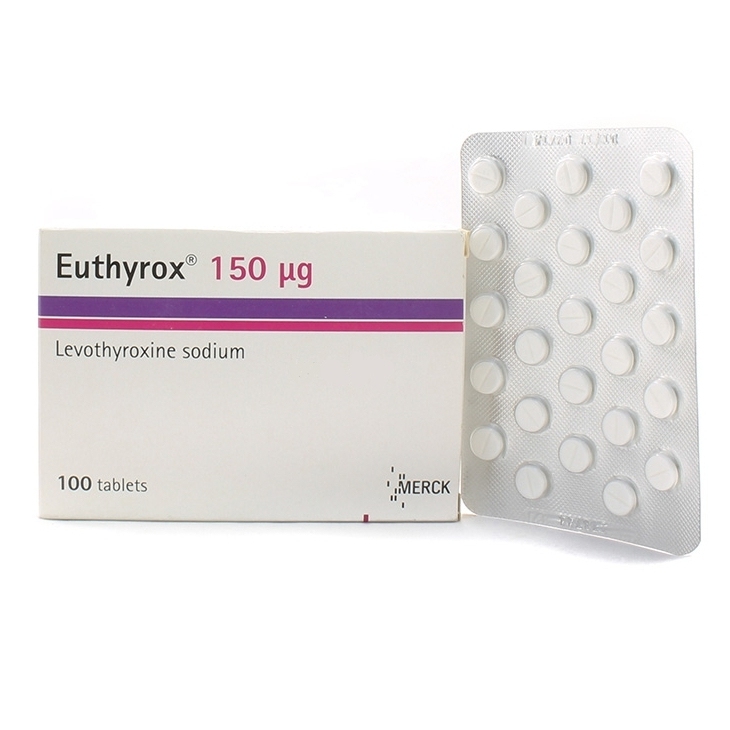
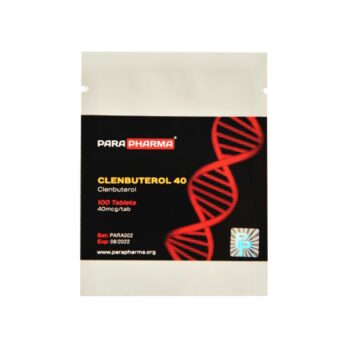
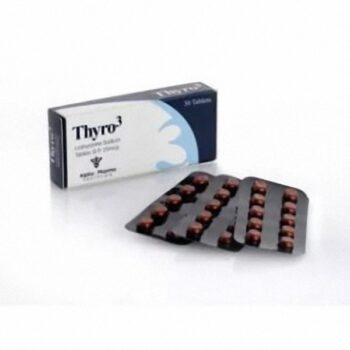
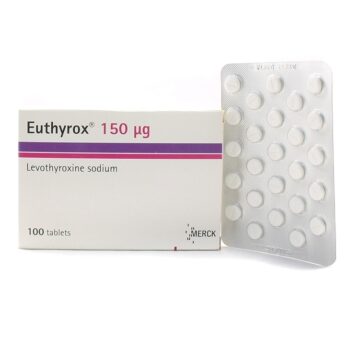
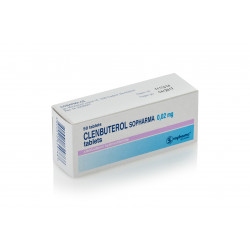

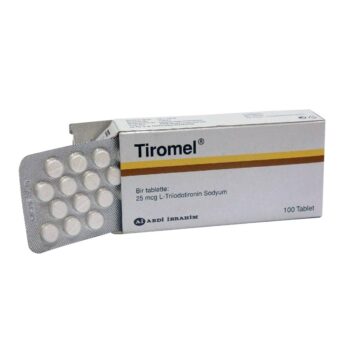
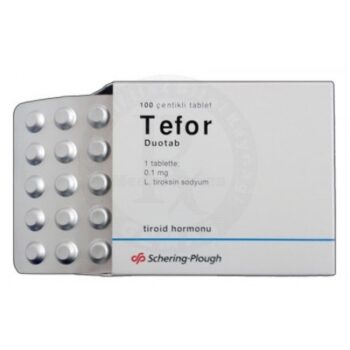


Reviews
There are no reviews yet.